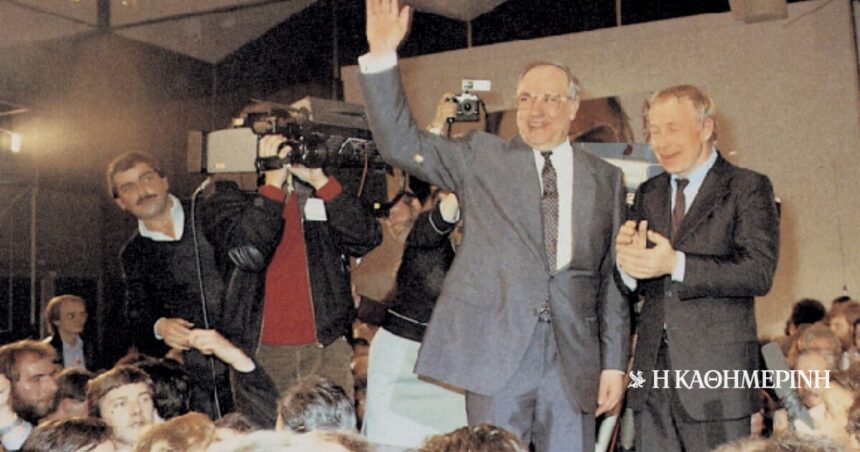Helmut Kohl, Ronald Reagan and Margaret Thatcher embodied during the 1980s the so-called conservative turn. However, the moderate Kohl rejected neoliberal policies and the complete deregulation of markets, but gave space to private initiative. Moreover, he never questioned the welfare state, which he tried to adapt to the difficult economic situation of that period.
Helmut Kohl’s tumultuous political career reached its peak when he managed to take advantage of the months-long crisis in the governing coalition of the Social Democrats and Free Democrats to convince the junior government partner (FDP) to vote in favor of a motion of no confidence against Helmut Schmidt. Eventually the fall of the Social Democratic government simultaneously ensured a “changing of the guard” between Helmut Schmidt and Christian Democratic leader Helmut Kohl in the chancellorship on 1 October 1982. This was truly an unexpected development, as the Christian Union (CDU/CSU) had completed 14 years in opposition, while the chancellorship of the Bavarian Franz-Josef Strauss had further reduced its percentage in the 1980 elections (44.5% against 48.6% in 1976, with Helmut Kohl as chancellor candidate).

“Stage” early polls
During the reading of his program statements in the Federal Parliament (13.10.1982) Helmut Kohl publicized the decision of the new government coalition of Christian Democrats and Free Democrats to dissolve the Parliament and call early elections. Since Kohl’s declared goal was the new strong popular mandate, so that the coalition of the Christian Union and the Free Democrats could continue unbroken the implementation of the joint government program, the then chancellor “directed” in December 1982 the government’s vote down in the Bundestag, giving a relevant order to the MPs of the government coalition. As the German Federal Constitutional Court finally rejected the appeal of the opposition MPs, who accused Kohl of violating the German constitution (Article 68), early elections were finally allowed to be held on 6 March 1983. Indeed, this development set a precedent, which it was exploited in 2005 by the Social Democratic Chancellor Gerhard Schroeder, in order to appeal in the same way to early elections, turning the process of granting a vote of confidence into a vote of no confidence in the Parliament. De Schröder invoked Helmut Kohl to reject the solution of resigning from the office of chancellor as a complicated and time-consuming process.
He was Germany’s longest-serving post-war chancellor, winning four elections from 1982 to 1998.
Measures to improve the economy
Popular former chancellor Helmut Schmidt’s decision not to run for chancellorship again in the national election of 6 March 1983, stating that he had decided to listen to his doctors’ advice and not put further strain on his health (he had already been fitted with a pacemaker) , led to a landslide victory for Kohl with 48.8%. In these early elections the CDU/CSU increased its share by 4.3%, while the candidacy of the former mayor of Munich, Hans-Jochen Vogel, reduced the SPD’s electoral performance to 1965 levels (38.2%).
Also noteworthy was the electoral percentage of the Greens, with which they secured their entry into the federal Parliament for the first time, with a percentage of 5.6%. This new party originated from the anti-nuclear-peace movements of West Germany, which organized the mass demonstrations against the installation of American missiles in the early 1980s, and already had a strong presence in the local parliaments. In fact, in 1985 the later leader of the Greens, Joska Fischer, became Minister of the Environment in the state of Hesse and a member of the first coalition government of Greens and Social Democrats in German parliamentary history.
As the 1983 elections were held amid high unemployment and rapidly increasing public debt, Helmut Kohl’s main campaign promise was to stabilize the German economy, which had already begun in the fall of 1982 with the implementation of austerity measures such as the temporary “freeze” salaries and pensions.
The Kohl government’s economic agenda included a mix of investment incentives for businesses and tax breaks, especially for families, which also benefited from high maternity and child benefits. Kohl achieved satisfactory growth rates while stabilizing the economy without further increasing the public debt. At the same time, he launched the partial privatization of the loss-making German post office and railways, while private television began operating during his days.
Loyal ally of the West with a vision of European integration
The new “spiritual and moral starting point” (Die Wende) envisioned by the new chancellor from the early 1980s was driven by the need to demonstrate that West Germany remained a loyal ally of the West and was therefore willing to defend the post-war peace and its credibility as a member of the North Atlantic Alliance.
That is why he decided to implement as a matter of priority the so-called “Dual-Track Decision” (Dual-Track Decision) of NATO for the modernization of the nuclear arsenal and the installation of Pershing and Cruise missiles on German soil, despite the negative attitude of public opinion and the intense reactions of Germany’s peace movement.
Considering the mistrust of Germany’s neighboring states, Kohl promoted the vision of European unification as a priority, giving particular importance to the strengthening of the Franco-German axis. The reconciliation between West Germany and France and the undertaking of joint political initiatives was also encouraged by the then French president François Mitterrand. In this context, the two leaders visited Verdun together 70 years after the start of World War I (1984), where they paid tribute to the victims of one of the deadliest (Franco-German) battles of this conflict, holding each other’s hand , in a highly symbolic move for the future of Europe.
Despite the Christian Democratic Party’s perennial effort to isolate the communist regimes of Eastern Europe, Kohl accepted the Ostpolitik launched by the Social Democrats in the 1970s to normalize West Germany’s relations with the communist states of Eastern Europe, which included Democratic Republic of Germany. In fact, Kohl promoted the rapprochement of the two Germanys, welcoming in 1987 for the first time the leader of East Germany, Erich Honecker, in Bonn.


German reunification
Helmut Kohl went down in history as the “chancellor of German reunification”, since the fall of the Berlin Wall in 1989 and the successful completion of the reunification process of the two Germanys was the event that sealed his political career. Despite accusations of political provincialism, which accompanied Kohl from the beginning of his career, when the Berlin Wall fell the German chancellor immediately realized the need to present a credible plan (“ten points”) to overcome the division of Germany and of Europe, ensuring not only the support of the West but also of the then leader of the Soviet Union, Mikhail Gorbachev.
Helmut Kohl was Germany’s longest-serving post-war chancellor, winning four terms from 1982 to 1998. Having himself traumatic memories of the devastation of the Second World War and a divided Europe, he left an indelible mark on German politics, while at the same time promoting the vision of European integration in order to ensure conditions of peace and security on our continent.
Mr. Nikos Papanastasiou is an assistant professor in the Department of Communication and Media of the Greek Academy of Sciences.
Diligence: Evanthis Chatzivasiliou




